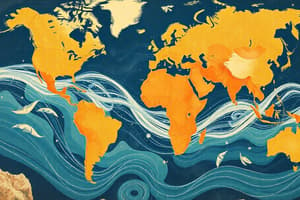Podcast
Questions and Answers
What is the primary driving force behind surface currents in the ocean?
What is the primary driving force behind surface currents in the ocean?
- Wind (correct)
- The circulation of water in the ocean
- Density differences
- Salinity differences
Which phenomenon plays a significant role in the global ocean conveyor belt system?
Which phenomenon plays a significant role in the global ocean conveyor belt system?
- Tidal waves
- River currents
- Surface currents
- The Coriolis effect (correct)
Deep ocean currents are primarily driven by:
Deep ocean currents are primarily driven by:
- Temperature differences
- Salinity differences
- Wind
- Density differences (correct)
What is the Coriolis effect influenced by?
What is the Coriolis effect influenced by?
Which ocean current circulation system helps regulate global climate?
Which ocean current circulation system helps regulate global climate?
What impact can changes in ocean currents have on weather patterns?
What impact can changes in ocean currents have on weather patterns?
Where do ocean currents move in circular or spiral patterns due to the Coriolis effect?
Where do ocean currents move in circular or spiral patterns due to the Coriolis effect?
How are ocean currents essential for ecosystems and daily life?
How are ocean currents essential for ecosystems and daily life?
What drives the global ocean conveyor belt system?
What drives the global ocean conveyor belt system?
How do ocean currents help distribute nutrients in marine ecosystems?
How do ocean currents help distribute nutrients in marine ecosystems?
Which hemisphere experiences counterclockwise ocean currents due to the Coriolis effect?
Which hemisphere experiences counterclockwise ocean currents due to the Coriolis effect?
What role do ocean currents play in influencing climate patterns globally?
What role do ocean currents play in influencing climate patterns globally?
Which oceanic phenomenon is responsible for transporting some marine species like jellyfish?
Which oceanic phenomenon is responsible for transporting some marine species like jellyfish?
What are vertical changes in ocean currents referred to as?
What are vertical changes in ocean currents referred to as?
Which of the following is not a type of ocean current?
Which of the following is not a type of ocean current?
What is the most common force driving ocean currents?
What is the most common force driving ocean currents?
How do ocean currents influence precipitation patterns?
How do ocean currents influence precipitation patterns?
Which of the following is a significant impact of ocean currents on marine life?
Which of the following is a significant impact of ocean currents on marine life?
Flashcards are hidden until you start studying
Study Notes
Ocean Currents
Ocean currents are continuous, directed movements of ocean water, both on the surface and in the depths. They impact climate, local ecosystems, and the seafood we consume. There are various types of ocean currents, and their formation is influenced by several factors, including wind, temperature, and salinity. In this article, we will discuss the types of ocean currents, their causes, effects on climate, and the global ocean conveyor belt, with a focus on the Coriolis effect.
Types of Ocean Currents
-
Surface Currents: These are directly influenced by wind and are found near the surface of the ocean. Examples include the Gulf Stream and the Kuroshio Current.
-
Deep Currents: These flow in the deep ocean and are driven by density differences and the circulation of water in the ocean.
-
Tidal Currents: These are short-lived and are caused by the rise and fall of tides.
-
River Currents: These are formed by the flow of freshwater from rivers into the ocean.
Causes of Ocean Currents
-
Wind: Wind directly drives surface currents, pushing water along the ocean's surface.
-
Temperature: Differences in temperature cause water to flow from warmer areas to cooler areas, creating thermal currents.
-
Salinity: Differences in salinity can also cause water to flow from areas of higher salinity to areas of lower salinity, creating salinity currents.
-
Earth's Rotation: The Coriolis effect, which is due to the Earth's rotation, influences the direction of ocean currents, causing them to move in circular or spiral patterns.
Effects of Ocean Currents on Climate
Ocean currents play a crucial role in global climate and regional weather patterns. They help regulate temperature, distribute heat, and influence precipitation. Changes in ocean currents can lead to extreme weather events like droughts, rainstorms, and hurricanes.
Global Ocean Conveyor Belt
The global ocean conveyor belt, also known as thermohaline circulation, is a large system of interconnected ocean currents that circulates water around the world. This system is driven by differences in temperature and salinity and helps regulate global climate.
Coriolis Effect
The Coriolis effect is the influence of the Earth's rotation on the movement of ocean currents. This effect causes currents to move in circular or spiral patterns. The strength of the Coriolis effect depends on the latitude, with stronger effects at higher latitudes.
In conclusion, ocean currents are an essential part of our planet's climate system. They influence climate, ecosystems, and our daily lives. Understanding the various types of ocean currents, their causes, and their effects on climate is crucial for predicting and mitigating the impacts of climate change.
Studying That Suits You
Use AI to generate personalized quizzes and flashcards to suit your learning preferences.





